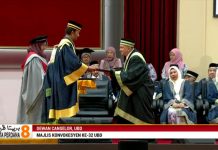بِسْمِ ٱللَّهِ ٱلرَّحْمَٰنِ ٱلرَّحِيمِ
Of the several traditions regarding the revelation of this surah, we quote that of Imam Ahmad which goes as follows:
Aisha said that the Messenger of Allah used to repeat very frequently, towards the end of his life, ‘Exaltations and praises be to Allah, whose forgiveness I ask; I repent of my sins.’ He also said, ‘My Lord told me I would see a sign in my nation. He ordered me to praise Him, the Forgiving, and ask His pardon when I see this sign. Indeed, I have. When the victory granted by Allah and the Conquest come … (transmitted by Muslim)
[youtube id=”T5trgPT4z78″ width=”600″ height=”350″]
The beginning of the first verse implicitly presents a concept of what goes on in this universe: the events that take place in this life, and the actual role of Muhammad and his followers in the progress of Islam, and to what extent it depends on their efforts. “When the victory granted by Allah”, denotes that it is Allah’s victory and Allah is the One Who brings it about in His Own good time, in the form He Decides and for the purpose He Determines. The Prophet and his companions have nothing to do with it at all, and they obtain no personal gain from it. It suffices them that He does it through them, appoints them as its guards and entrusts it to them. This is all they acquire from the victory of Allah, the Conquest and the people’s acceptance en masse of His religion.
According to this concept, the duty of the Messenger and his companions whom Allah chose and gave the privilege of being the instruments of His victory, was to turn to Him at the climax of victory in praise, expressing gratitude and seeking forgiveness. Gratitude and praise are for His being so generous as to have chosen them to be the standard bearers of His religion; for the mercy and favour He did to all humanity by making His religion victorious; and for the Conquest of Makka and the people’s collective acceptance of Islam.
His forgiveness is sought for the various unrevealed, defective feelings, such as vanity, which sometimes creep into one’s heart at the overwhelming moment of victory attained after a long struggle. Human beings can hardly prevent this happening and therefore Allah’s forgiveness is to be sought for it. Forgiveness also has to be sought for what might have been insinuated into one’s heart during the long and cruel struggle and for petulance resulting from the belatedness of victory or the effects of convulsive despair, as the Qur’an brings out elsewhere: Or think you that you will enter Paradise while yet there has not come to you the like of that which came to those who died before you? Affliction and adversity befell them; they were shaken as with earthquake, till the Messenger (of Allah) and those who believed along with him said: ‘When will Allah’s help come?’ Now surely Allah’s help is near. (Al-Qur’an 2:214)
It is also necessary to seek Allah’s forgiveness for one’s shortcomings in praising Allah and thanking Him for His favours which are perpetual and infinite. And if you were to count the favours of Allah, never will you be able to number them. (Al-Qur’an 16:18)
—————————————
× The month of Rabee’ Al-Awwal includes three important events which are; the birth of the Prophet sallallaahu ‘alaihi wa sallam, his migration to Madeenah and his death.
× His migration was far more important than his birth, because it resulted in the establishment of the Muslim community and the first Islamic state. This state lasted for many centuries and introduced to humanity a distinguished civilization that was unsurpassed in history. Due to the importance of this event, ‘Umar ibn Al-Khattaab, may Allaah be pleased with him, and the Muslims after him based the recording of Islamic history according to it. Ash-Shu’bi narrated that: “Abu Moosaa, may Allaah be pleased with him, wrote to ‘Umar, may Allaah be pleased with him (When he was the ruler of the Muslims), saying: ‘we receive undated letters from you (i.e. we need them to be dated).’ So ‘Umar, may Allaah be pleased with him, gathered the people to decide on a method for initiating the method of dating. Some people suggested starting from the exact time that revelation began while others suggested beginning from the time of the migration. ‘Umar, may Allaah be pleased with him, agreed with the second view and said: ‘The migration distinguished the truth from falsehood, so use it as a starting point”‘(Ibn Abu Shaybah).
× When the Prophet sallallaahu ‘alaihi wa sallam died, Umm Ayman, may Allaah be pleased with her, cried. When she was asked why, she replied: “I swear by Allaah that I knew the Prophet sallallaahu ‘alaihi wa sallam would eventually die, but I am crying because the revelation has stopped descending.” (Ahmad).
The extreme pain he suffered:
Ibn Hajar, may Allaah have mercy upon him, said: “The majority of scholars are of the view that the death-sickness of the Prophet sallallaahu ‘alaihi wa sallam lasted for thirteen days. Some have added a day while others have deducted one. Also, there is group who hold the view that it only lasted for ten days”.
Adapted from alminbar
 |
Islamic Funeral & Death Rites Course ( 8 Hours ) 20 July 2013, 2pm to 6pm 20 July 2013, 2pm to 6pm
Venue: Sultan Mosque, AuditoriumDetails» |









